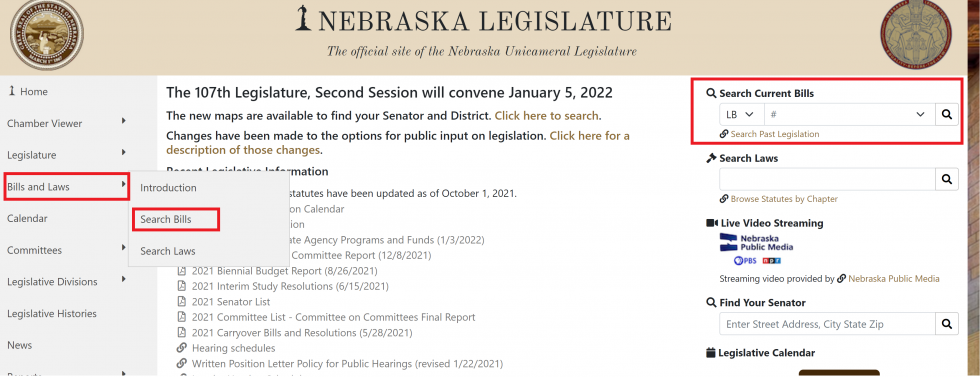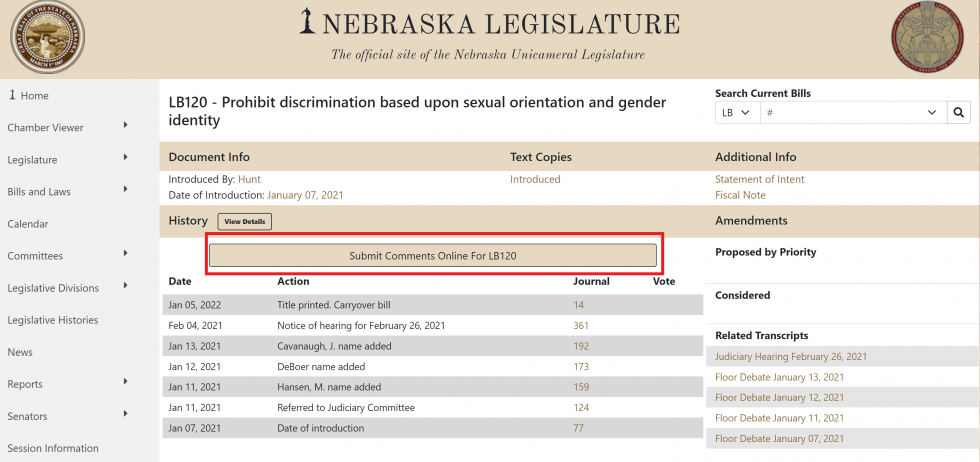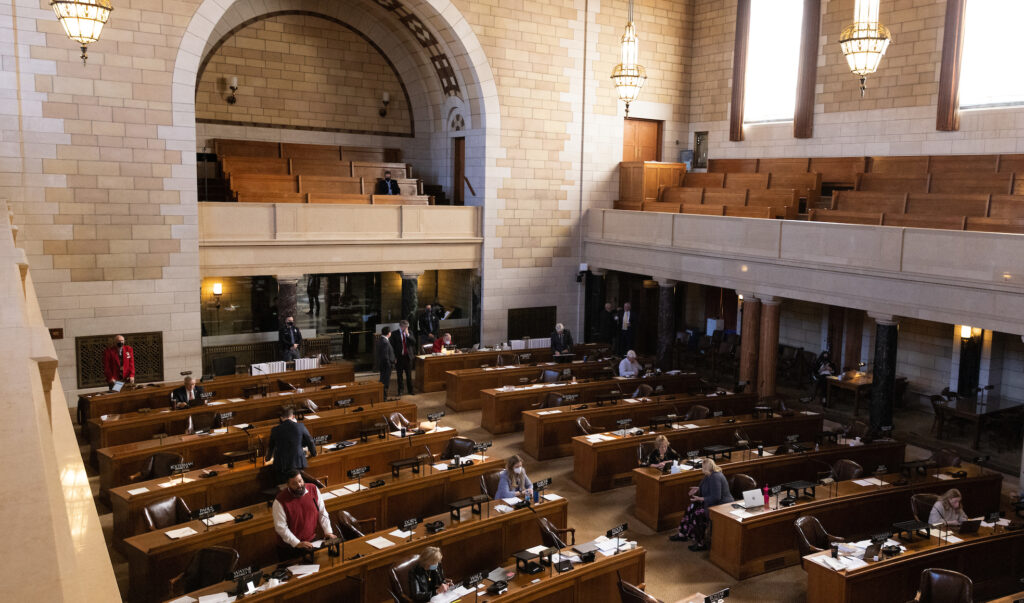Speak Out Nebraska: Stay Tuned!
As part of our coverage, we’re hosting Speak Out Nebraska, our virtual event series to gather and discuss the 2023 session. The agenda includes topics such as how the legislature works, bills we’re tracking, and how to contact your representatives. Our first meeting was January 24, and the recording is available to watch here. Stay tuned for when we announce the next meeting!
Legislature 101
The Nebraska State Senate, also known as the Nebraska Unicameral, is the legislative body of the state of Nebraska responsible for proposing, drafting and passing laws, or legislation, as well as establishing the state budget.
Nebraska is the only state in the nation with a unicameral legislature, meaning there is only one legislative body making decisions. Other state legislatures are separated into two houses, usually referred to as the Senate and upper house. The unicameral is also nonpartisan and does not officially recognize party affiliations amongst its members.
Here are some key facts to know about the legislative process:
- Bills are introduced in the first ten days of the legislative session. After they are introduced, bills are directed to one of 14 committees where they will receive public hearings.
- After the hearing, committees may vote to advance the bill with or without amendments, postpone the bill or take no action on it.
- Senators then have the opportunity to debate, propose amendments and vote on bills. If a bill passes a majority vote, it will move on to Select File. Select File is the second phase of debate and voting and allows another opportunity for amendments. Bills may be indefinitely postponed or move on.
- Before they can pass, bills must go through Final Reading, where they are read aloud by the clerk. After that, bills require a simple majority vote before going to the governor.
- After the legislature passes a bill, it goes to the governor. If the governor signs a bill or declines to act on it, the bill becomes law. The governor may also veto a bill. The legislature may override any veto from the governor with 30 votes.
Making Your Voice Heard
Whether you’re emailing your representative, testifying in-person or submitting online comment, your statement should follow the same structure: introduce yourself and your connection to the bill at hand, state your ask and why it matters to you and thank your representative for their time. A more in-depth guide with an example can be found here.
Email your senator
The easiest way to make your voice heard is to email your representative. While comments received through email won’t appear on any official record, it is still a valuable contribution to the legislative process. Click here to find your senator.
Testify at a public hearing
The most impactful way to make your voice heard is through in-person testimony at public hearings. This is a chance for you to read a statement to committee members.Â
They may ask you clarifying questions on your testimony, which may be about where statistics came from or to have you expand on your personal experience. When you come to share testimony, the committee chair will say how long you have to speak. Generally you will have 5 minutes, but if there are a lot of people looking to give comments, the time may be reduced to 2-3 minutes.
It is helpful to come with your statement written down or printed out. You can also bring 12 copies of your testimony to have it distributed to the committee members. Be sure to include: Your name, your address, and why you support/oppose/are neutral.
On hearing days, those for the bill (proponents) will testify first, followed by those against the bill (opponents), and those neutral go last. If you have questions about testifying, send us a message!
Submit written comment online
You can submit comment on a bill as soon as a public hearing is scheduled. All comments must be submitted before 12:00 p.m. (CST) the last work day before the public hearing (so if a bill has a Tuesday hearing, comments must be in by noon on Monday; if a bill has a Monday hearing, comments must be in by noon on Friday).Â
Treat this comment as a position letter. Fill out your information and leave a statement about why you support/oppose/are neutral on the bill.
You can find a more detailed guide on submitting online comment below.
- Navigate to the Nebraska legislature website.
- Find the bill you would like to comment on. You can either search for the bill on the right-hand side search bar OR navigate to the “search bills†page on the left-hand side.

- Once on the bill’s page, you can see all actions taken on the bill and read the full text. Click “Submit Comments Online for LB###†to leave comments on the bill.

- Read through the notification on written comments and click “I Understand.
- Click “Yes†on the “Include Comment in Hearing Record†question if you want your comment to be officially recorded in the public record.
- Fill out your personal information and your email will be used to confirm your comment submission and in case a senator would like to get in touch with you.
- Write your written comment in the box. Note: You have a 500 word limit.
- Complete the reCAPTCHA prompt and then click the “Submit Comment†button at the bottom of the page.
- You will get an email shortly afterwards asking you to click a link to confirm your comment submission. Once you confirm your comments, your comment is finally submitted

